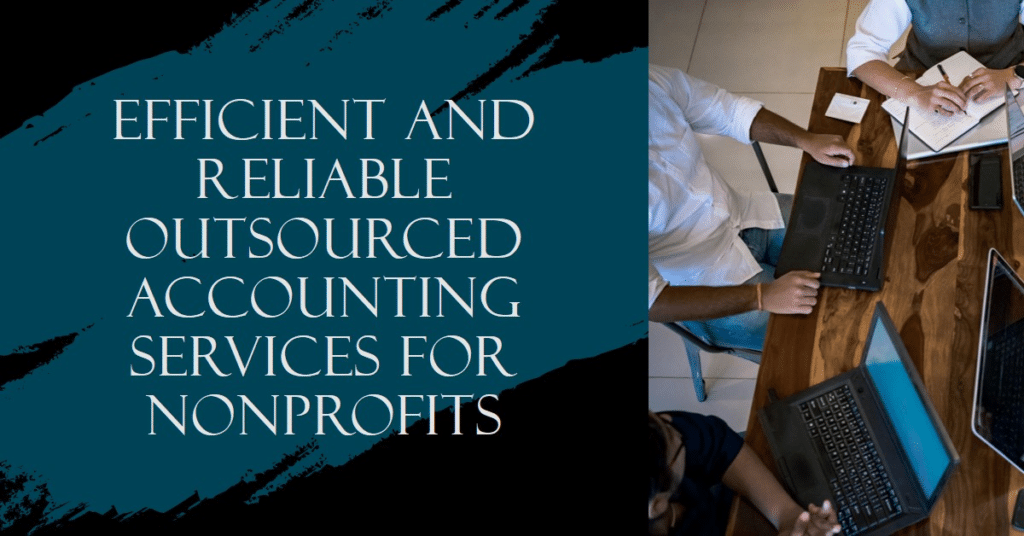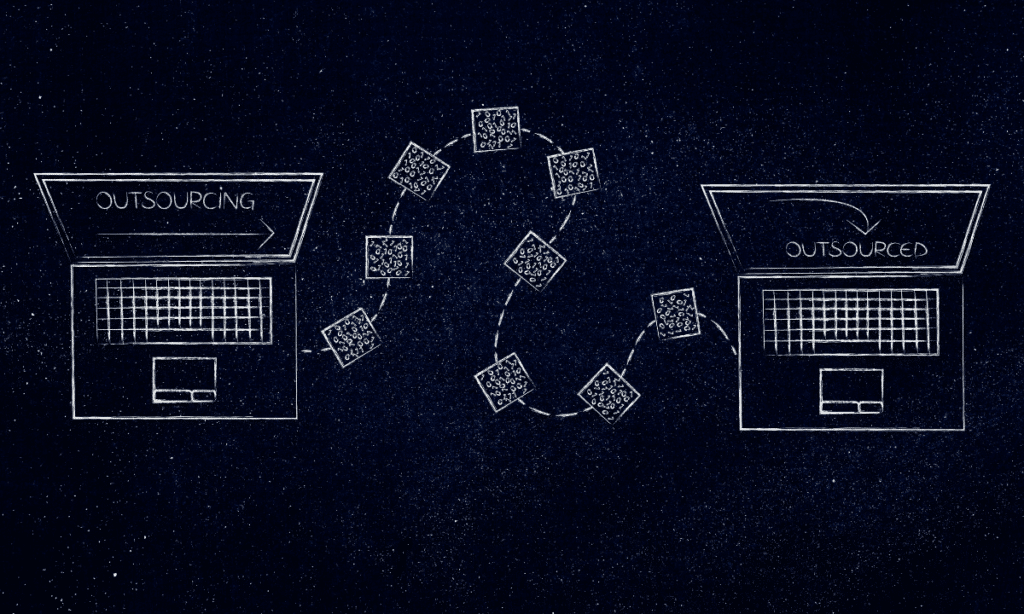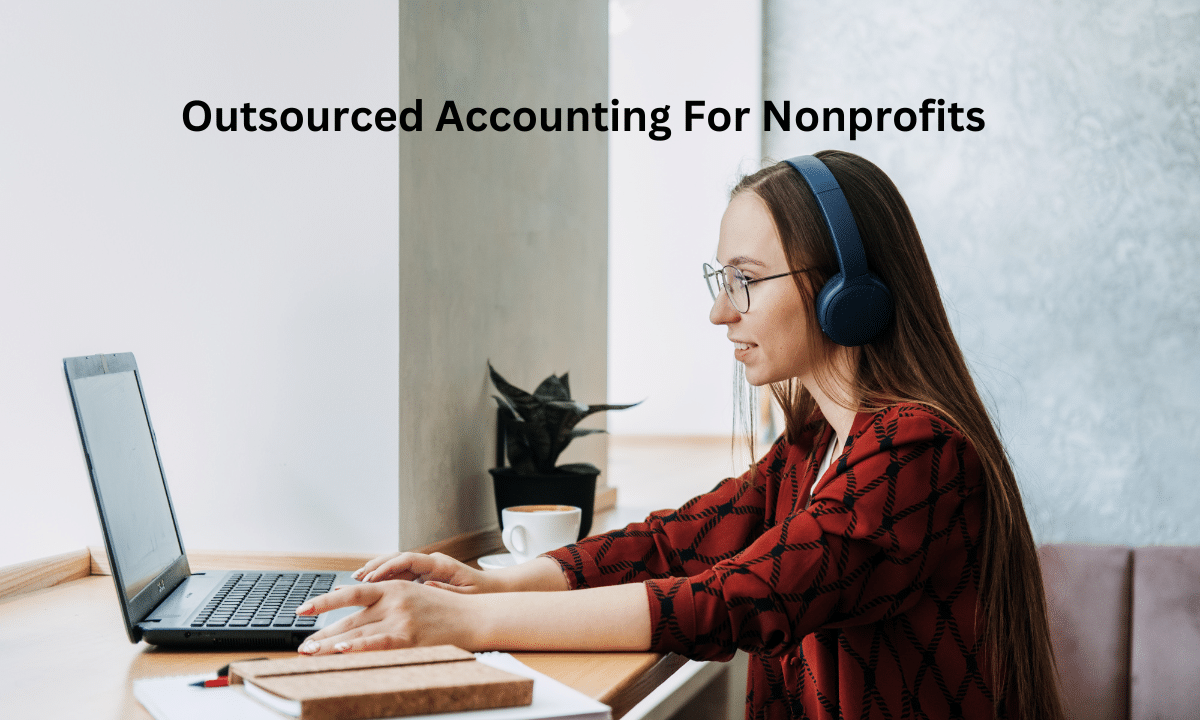Accounting is a crucial but complex task for nonprofit organizations. Nonprofit organizations provide numerous beneficial and frequently life-saving services for the society. This article discusses what is outsourced accounting for nonprofits, how outsourcing accounting benefits nonprofits, and the factors to consider when choosing an accounting firm.
However, this does not imply that organizations pay less attention to their financial data than businesses do. Nonprofits must carefully examine their finances to meet different financing criteria and constraints while increasing program efficiencies.
It requires expertise and dedication of resources that many such organizations lack. Outsourcing accounting to specialized firms can help nonprofits manage their finances efficiently and comply with legal requirements.
What is outsourced accounting for nonprofits?

Outsourced accounting services for nonprofits involve hiring an external accounting firm to handle an organization’s financial tasks. These firms have professional accountants and bookkeepers who handle their clients’ day-to-day bookkeeping, financial reporting, tax compliance, and advisory services. By outsourcing accounting, nonprofits can focus on their core mission while benefitting from accounting professionals’ specialized skills and technology.
Benefits of outsourced accounting for nonprofits
Outsourced accounting for nonprofits provides several important benefits to nonprofit organizations:
- It reduces accounting costs by eliminating the need to hire and pay full-time accountants.
- Outsourcing firms also have advanced accounting software and expertise to ensure compliance with accounting standards and tax laws.
- Accounting professionals who work with multiple clients remain updated with the latest financial regulations.
This helps nonprofits meet reporting deadlines and mitigate compliance risks.
Factors to consider when choosing an Outsourcing firm for non-profits
There are a few critical factors nonprofits must evaluate when selecting an outsource accounting services for nonprofits.
- Firstly, the firm should have proven experience serving nonprofits and understanding their unique needs.
- Secondly, assessing the credentials and qualifications of individual accountants who will handle the work is important. Cost, commitment to quality service, and communication effectiveness must also be evaluated.
- Nonprofits should shortlist firms that match their budget and provide references from similar clients.
Why nonprofits are outsourcing their bookkeeping and other financial processes

There are several compelling reasons why more nonprofits are outsourcing routine bookkeeping and core accounting functions:
Cost savings
Managing finances in-house requires employing full-time accountants and bookkeepers. It also demands continuous investment in upgraded accounting software, training, tools, and equipment to address evolving compliance needs.
These overheads impose a significant financial strain on small to mid-sized nonprofits working on minimal budgets. Outsourcing allows shifting such fixed costs to a variable operating expense.
Nonprofits pay only for the actual services utilized each month or quarter. This provides annual savings while receiving specialist assistance to complete mandatory financial tasks. The streamlined cost structure aids nonprofits’ sustainability and reallocation of resources to their mission activities.
Compliance expertise
Financial regulations and reporting standards set by authorities are continuously enhanced in the dynamic nonprofit environment. Multiple changes in a year are not uncommon. It is unrealistic for nonprofits to keep their in-house teams fully equipped with the latest knowledge through extensive training alone.
Outsourcing to accounting firms that specialize in the nonprofit domain rectifies this challenge. Specialists employed by such firms remain updated through their engagement with multiple clients and regular training programs. They comprehend shifting nuances and ensure compliance. This eases the governance burden on nonprofits and lowers risks of regulatory penalties or loss of public trust due to inadvertent non-compliance.
Focus on the core mission
With full-time bookkeepers tied up in repetitive record-keeping, reconciliation, and reporting tasks, it is difficult for nonprofits to dedicate optimal time to exploring new programs, services, or beneficiary needs. Outsourcing sets them fully free from time-consuming finance and accounting functions.
Instead, program managers and executives can channel their efforts into strategic planning, project management, fundraising, community outreach, and impact assessment. This enhances nonprofits’ focus on their pioneering roles with more responsiveness, skill, and community engagement. They return to their purpose of driving positive social change rather than struggling with financial paperwork.
Convenient access to advanced tools
Most outsourcing firms deploy powerful cloud-based accounting and reporting software for the sector. This spares nonprofits’ hefty up-front license costs and uncertainty around optimal tool selection. Advanced payroll, audits, budgeting, and mobile access features are available. Digital solutions boost speed, accuracy, and insights into organizational performance to aid well-informed decisions that benefit stakeholders.
Services offered by accounting Outsourcing firms for non-profits

Top outsourced accounting services for nonprofits offer various core and specialized services tailored to nonprofits’ needs. The basic services include bookkeeping, financial statement preparation, payroll processing, and tax filings.
Advanced services include budgeting and forecasting, audit readiness, internal controls review, risk assessment, and fundraising accounting. Some firms offer advisory services on accounting software selection, financial management best practices, and strategic planning. This wide range of services ensures all financial needs of nonprofits are comprehensively addressed.
How to prepare for outsourcing transition
Nonprofits must prepare well to ensure a smooth transition to outsourced accounting. They need to gather all financial documents from the previous years, record all assets and liabilities, and document existing accounting systems and processes. Data should be organized neatly for easy sharing.
Outsourced accounting services for nonprofits should also clarify the scope of work, expectations from the firm, budget, and timelines. Internal staff will need training on using the new systems and cooperating with the accounting team. Proper planning facilitates a seamless transition, enabling nonprofits to benefit early from outsourcing.
How to select accounting software with outsourcing firms
Accounting software is a critical aspect impacting outsourcing engagement. Nonprofits must discuss software options with shortlisted firms and evaluate features like ease of use, reporting capabilities, integration with other systems, and costs.
Popular choices for nonprofits include Sage Intacct, Blackbaud Financial Edge NXT, and Aplos Software. The software must support the entire accounting process, provide flexibility, and meet compliance needs. The nonprofit and the firm must be comfortable using the selected software to avoid future challenges.
How to develop the Negotiating terms of engagement
Nonprofits must formally engage the selected accounting firm by developing terms of engagement or services agreement. This legal contract specifies the scope of each service, timelines, responsibilities of both parties, expected turnaround times, budgets, and payment schedules.
The agreement should also mention compliance requirements to be met, data access and security protocols, dispute resolution process, and terms of termination if required. Nonprofits must understand this contract fully before signing it to ensure a protected and smooth long-term working relationship with the outsourced accounting firm.
How Nonprofits can manage the relationship with outsourcing firms
Even after outsourcing begins, nonprofits need to manage the working relationship proactively. Regular communications, preferably monthly meetings, help exchange feedback and resolve issues.
Nonprofits must also establish clear channels to monitor turnaround times on Requests For Information, receive monthly or quarterly reports on time, and assess the quality of work periodically. Handling concerns promptly and cooperating fully with audits shows the nonprofit’s commitment. Transparent communication and addressing each other’s needs help build high trust and satisfaction in outsourcing engagements over the long run.
Conclusion
outsourced accounting for nonprofits is a smart strategic decision for many cash-strapped nonprofits. It delivers significant benefits when implemented carefully by selecting reputed firms, agreeing on comprehensive terms, and maintaining open communication.
Outsourcing reduces financial management costs and risks. It allows nonprofits to focus on serving their mission while meeting all statutory compliances expertly. A well-managed outsourcing relationship aids nonprofit sustainability, growth, and public trust over time.
Frequently Asked Questions (FAQs)
Q1. What are the main advantages of outsourcing accounting?
Ans 1: Outsourcing accounting allows non-profits to focus on their mission without worrying about finances. It gives access to expert help at affordable prices and ensures compliance with all accounting rules.
Q2. how much does it cost for nonprofits to outsource accounting?
Ans 2: Outsourced accounting costs depend on the services used and the accountant’s experience. But most firms charge affordable flat monthly fees or hourly rates much lower than hiring full-time staff.
Q3. What tasks do outsourced accountants generally handle?
Ans 3: Outsourced accountants usually manage day-to-day bookkeeping, prepare financial reports, take care of payroll, and ensure taxes are filed correctly and on time. Some also help with budgeting, fundraising reporting, and audit preparations.
Q4. How do I find a trusted accounting outsourcing firm?
Ans 4: Ask other similar non-profits for referrals, search online for those specializing in your location and sector, check reviews and ensure they understand non-profit accounting well before hiring—interview shortlisted firms to assess their experience and fees.
Also Read:








